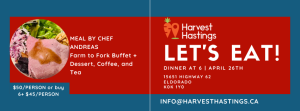Susan Chan, author of “A Landowners Guide to Conserving Native Pollinators in Ontario”, spoke to Harvest County beekeepers about the significance of terroir (or the land ) in determining flavour of different honeys. She is keen to develop a language to describe the different flavours of honey. Honey, like fine wine, is a product of the land. Roger and Valerie Kelly of Kellys’ Berries organized the event held in Bancroft in early March. They provided an excellent lunch.
This is a recording of her hour-long talk. After the talk we all sampled a number of different honeys and were surprised by the great variety of flavours.
The Hastings Federation of Women’s Institutes and the Hastings Cattlemen have invited Susan Chan to talk at the Ivanhoe Veteran Hall in October 10.
After listenning to Susan Chan talk about the importance of terroir when it comes to honey, Louise Livingstone said she was interested to read about beekeeping in rural Greece. According to the Federation of Greek Beekeepers’ Associations (OMSE) “Greek honey owes its unique aroma and taste to the fact that the better part of Greece is home to forests and wild ecosystems with only 29.32 percent of the land allocated to farming.”
Ian Frazer of Tweedle Bee, Tweed, says we produce some of the best honey in Canada in this part of Ontario. This is probably because, like Greece, Hastings County is home to forests and wild ecosystems and there is a relatively low percentage of land allocated to farming. We need to get out and taste the different honeys bee keepers harvest in Hastings County. Each one has its own terroir.

We’re Hiring!
Harvest Hastings is looking for someone to join the team! If you are someone with a passion for supporting local food and


